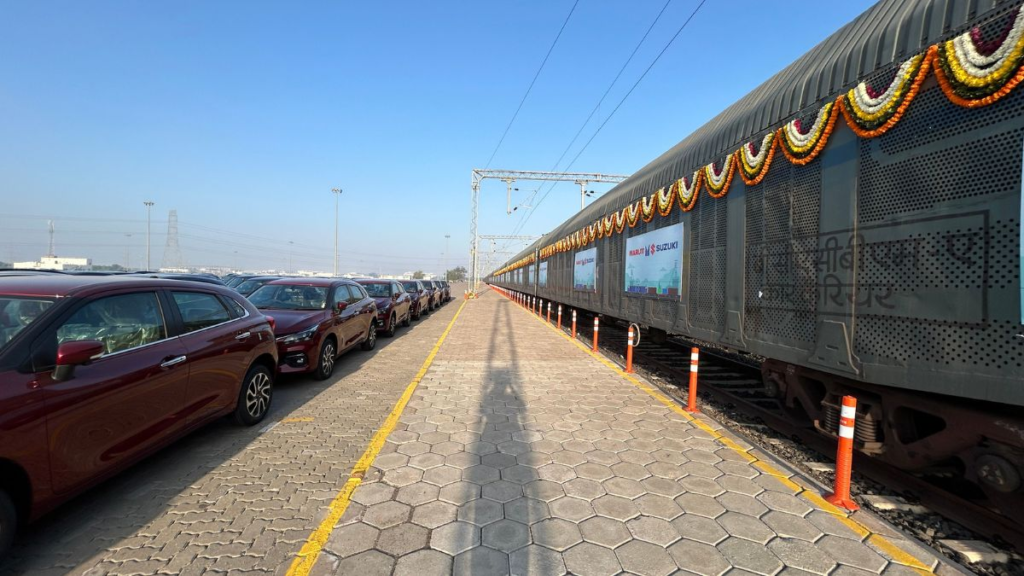On Tuesday, Prime Minister Narendra Modi virtually inaugurated India’s first automobile in-plant railway siding project at Maruti Suzuki’s plant in Hansalpur, Gujarat’s Mehsana district.
During his visit to Gujarat, PM Modi also initiated and laid the foundation stone for railway projects worth Rs 85,000 crore. This included the introduction of 10 new Vande Bharat trains, all from the Sabarmati area in Ahmedabad, Gujarat, following his visit to the Dedicated Freight Corridor’s Operation Control Centre.
The inauguration of the in-plant railway siding project at MSIL marked a significant milestone. Developed as part of the Centre’s PM Gati Shakti mission in collaboration with the Gujarat government, Indian Railways, and MSIL, the project incurred a cost of Rs 976 crore. Rahul Bharti, MSIL’s Executive Officer of Corporate Affairs, highlighted that this initiative is the first of its kind in India for any automobile company.
This exemplifies the essence of the Gati Shakti programme,” Bharti expressed to the media gathered. The initiative was crafted through a dedicated entity – Bahucharaji Rail Corporation Limited (BRCL) – established with Gujarat Railway Infrastructure Development Corporation (GRIDE), Gujarat Industrial Development Corporation (GIDC), and MSIL as partners holding 49%, 29%, and 26% shares respectively. GRIDE stands as a collaboration between the Gujarat government and the Ministry of Railways. The railway infrastructure within the Bahucharaji facility has been entirely constructed by Maruti Suzuki at an investment of Rs 105 crore, as stated by Bharti.

The project will reduce MSIL’s annual truck trips by 50,000, aiming to boost railway dispatches of finished cars from the current 26% to 40% at full capacity. This initiative is set to save 35 million litres of fuel and reduce 1,650 tonnes of carbon emissions yearly. Bharti highlighted that logistics plays a crucial role in curbing carbon emissions, steering us towards carbon neutrality. The shift from road to rail dispatches will not only alleviate road congestion but also benefit the environment and society at large.
A single train can replace 40 trucks on a route, eliminating 64,000 km of road travel. The railway line can dispatch 300,000 cars annually, with parking space for 800 cars expandable to 3,000. Maruti Suzuki has sent approximately 1.8 million cars by rail until February. In the current fiscal year until February, railways have dispatched 409,000 cars. We have the highest railway dispatch rate among all car manufacturers in the country.
We’ve already dispatched over 21% of our goods this year, with plans to boost this further, as stated by the company’s executive. Our aim is to increase the proportion of railway shipments for both domestic dealer deliveries and exports. Notably, our exports have seen a growth, with 42% of cars now being shipped from India. This number is set to rise significantly in the coming years.
In order to achieve this goal, we have invested in building new railway terminals and increasing the capacity of existing ones. This has allowed us to streamline our operations and reduce transportation costs, ultimately benefiting both our company and customers.
Moreover, by utilizing railways as a mode of transportation, we are able to contribute towards reducing carbon emissions. Our commitment towards sustainability also includes implementing environmentally-friendly practices throughout our production process.
But it’s not just about reaching our targets, we also strive to provide timely and efficient delivery for our customers. By utilizing railways, we are able to bypass road traffic congestion and ensure faster movement of goods. This means that your orders will reach you in a more timely manner, ensuring customer satisfaction.
Also Read: Sabarmati Ashram Restoration: PM Modi unveils ₹1.2 billion Gandhi Ashram Memorial Plan in Gujarat.
We understand that time is crucial in today’s fast-paced world, and that’s why we have made it our priority to choose the most efficient and sustainable mode of transportation. This not only benefits us as a company but also allows us to provide better service to our customers.